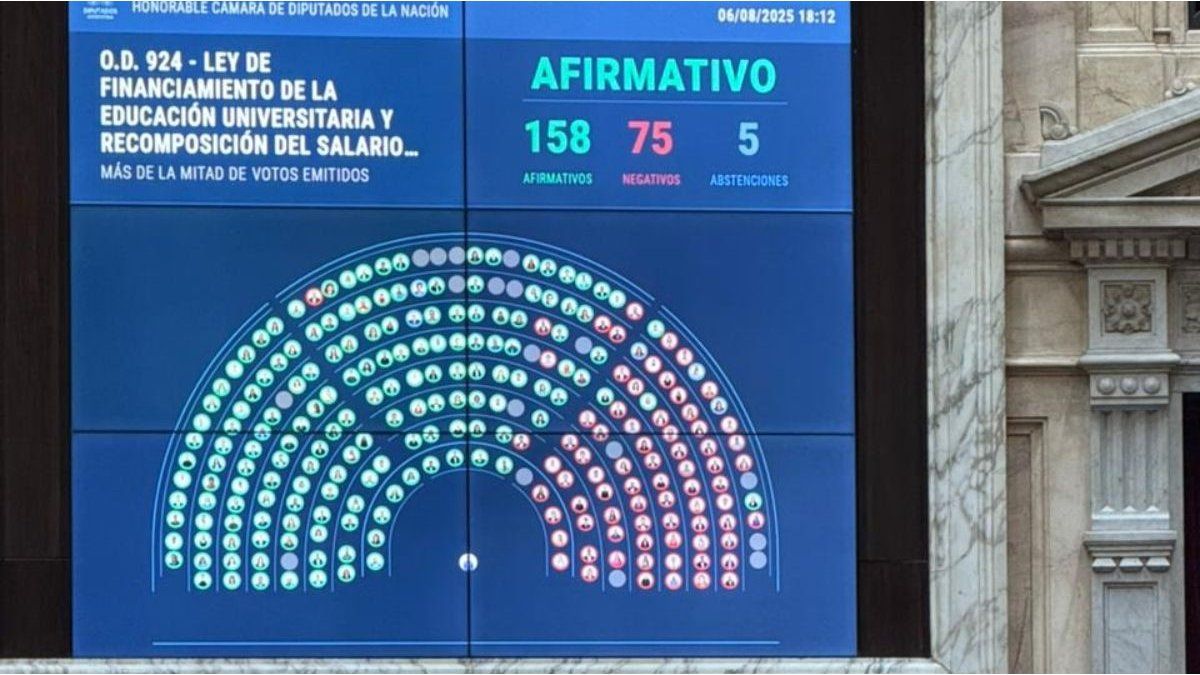It seems to be the time of the “Congress“: The growing possibility that the National Congress Reasuma – to its way – a leading paper in the approval and sanction of specific budget itemsoriented to critical areas such as health, education, transfers to the provinces, disability and social security. The last hours account for it.
The government comes from suffering a hard defeat. The opposition approved the emergency in the claw and university financing. In addition, the commission treatment of the projects of the governors and the changes in the Crypto Commission was imposed, while the decrees against roads, the merchant navy, the INTI and the INTA were rejected. But in addition that defeat is double: they point out in the Casa Rosada that this type of maneuvers “exposes them” in the middle of the electoral career, to the point that, last night, The possibility of ending by giving in some issue related to pediatric emergency and disability was weighed.
Political reading would force to think that this dynamic represents a counterweight To the executive approach of strict fiscal adjustment, and could mark a turn towards a more decentralized and plural management of public resources, in response to accumulated social demands. However, this perspective clashes frontally with the recommendations issued by the International Monetary Fund (IMF) in its review of the Extended Facilities Agreement, approved on July 31. The multilateral organism It urges the government to maintain a primary surplus of 1.6% of GDP for 2025prioritizing the Fiscal discipline and the necessary adjustments to guarantee sufficient margin in the payment of the external debt.
The “recommendations” of the IMF, an additional pressure for Luis Caputo
Specifically, The IMF emphasizes the need for strict controls in spending, including reforms in energy subsidies, pensions and social programssuch as universal child allocation (AUH), where more rigorous eligibility controls are proposed to optimize resources and avoid deviations. These measures, although destined to rebuild international reserves and sustain disinflation, imply a containment of social spending that could limit legislative initiatives.
Additional IMF recommendations include structural reforms, such as the simplification of the tax system by December 2025the presentation of a diagnosis on the pension reform for December 2026 – with an emphasis on improving the proportionality between contributions and benefits – and the Gradual reduction of energy subsidies until cost coverageprojecting a decrease of 1.5% of GDP in 2024 to 0.1% in 2030.
In addition, the agency granted “WAIVERS” for breach of the performance criteria in the accumulation of Net International Reserves (NIR), modifying the objectives by the end of 2025 and recognizing corrective actions of the government, such as opportunistic currency purchases. In the monetary plane, it is advisable to maintain strict conditions and move towards a flexible exchange rate regime, all for “strengthen debt sustainability “which is expected to reduce 85% of GDP in 2024 to 55% in 2030.
This set of guidelines is inserted into an electoral context marked by October legislative electionswhere 127 seats will be renewed in deputies and 24 in the Senate. In a scenario of variable surveys -with freedom, progress leading in some polls, but facing union competition for the homeland and other blocks -the Congress, in campaign mode, intensifies the pressure on the Executive, rejecting decrees and potentially promoting expansive budgetary approvals -where electoral speculation is not lacking -, which could alter legislative control and complicate the implementation of fiscal adjustment policies.
Javier Milei’s tax adjustment and the possibility of modifying goals
The data that must be taken into account is that the fiscal adjustment promoted by the president Javier Milei Since the beginning of his mandate, it has been characterized by significant reductions in primary expenditure, according to the analysis of the Argentine Political Economy Center (CEPA). Until June 2025, Total primary expenditure registered a real year -on -year contraction of 34.8% compared to 2023although it showed a slight recovery of 0.6% compared to June 2024, consolidating the focus on containment to achieve monthly surpluses.
In Social Security, Social benefits fell 16.9% in real terms versus 2023with 12.3% cuts in retirement and contributory pensions, 13.8% in non -contributory pensions and 41.3% in family assignments, partially compensated by an increase of 56.7% in the AUH and 11.4% in PAMI benefits. The Transfers to provinces experienced a real 34.3% drop compared to 2023despite an increase of 136.5% versus 2024 driven by judicial obligations. The Economic subsidies were drastically reduced 81.5% real against 2023 (With 86.6% drops in energy and 59.8% in transport), and 28.4% versus 2024, reflecting the discontinuity of compensation and lower gas import. Finally, capital expenses fell 82.1% real compared to 2023, without signs of reactivation in public works.
This structure of the adjustment, which prioritizes the reduction in subsidies, public investment and most social benefits, has allowed accumulating fiscal surpluses, but at the expense of eroding purchasing power and essential services. The CEPA emphasizes that, despite adjustments in the mobility formula to index inflation, real improvements in social spending are not observed, and warns about possible breaches in legal mandates to reactivate investments.
This dichotomy raises Challenges for the Government. As it transpired, It is evaluated at this time what way to followsince there are voices in the Palace of Finance that manifest some type of inflection. Basically they recognize that they could “give up” spending for emergency in pediatrics and disability, while new goals with the IMF would be negotiated, slightly lower in surplus. Analysts warn that if Congress advances in sanctioning autonomous departments, it could generate a debate on tax sovereignty, but also risks of confrontation with the Executive and possible presidential vetoes.
Source: Ambito




